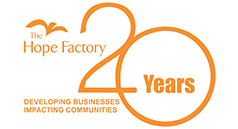The Hope Factory – Giving hope to prospective entrepreneurs
The Chartered Accountancy profession, through the South African Institute of Chartered Accountants (SAICA), is passionately committed to job creation and training.
Evidence of such commitment and involvement is SAICA's enterprise development initiative, The Hope Factory Wealth Creation project.
The Hope Factory, founded in 2001, manufactures a wide range of beautiful and handmade corporate gifts and conference materials tailored to suit the corporate market. It also focuses on training and job creation.
Training is provided in:
- Technical Skills (sewing, patternmaking, beadwork and other crafts);
- Business Skills (entrepreneurship and small business); and
- Life Skills (time management, CV writing and HIV/AIDS).
Once learners have graduated, they can choose to either start their own businesses, seek formal sector employment, study further or join The Hope Factory job creation project. Graduates manufacture corporate gifts and conference materials, which are sold, to companies throughout South Africa.
The Hope Factory has helped provide opportunities for the unemployed to become financially productive and to gain practical work experience. To date, the factory has trained more than 424 unemployed people and provided job creation opportunities to 80 staff members.
The 15 week course offered by The Hope Factory has transformed many lives. Throughout the course, mentorship, advice and support as well as networking opportunities for further training or employment are provided. After the course, trainees can choose to join The Hope Factory's job creation programme, which gives them the chance to gain practical experience while earning an income.
Siphokazi Dumezweni, a trainee in the programme, says of her experience: “I did not know how to sew on the machine but now I can do anything from cushion covers to hats – enough to start my own business.”
Currently, The Hope Factory employs between 50 and 80 graduates on a contract basis, and trains 72 learners annually who are funded by the Department of Labour in the Eastern Cape
Benefits for organisations buying from The Hope Factory
Organisations that purchase gifts and conference materials from The Hope Factory will be giving unemployed women the gift of financial freedom and practical work experience.
The added advantage for organisations that purchase corporate gifts from a 100% BEE enterprise development supplier such as The Hope Factory is that they are eligible to claim such expenditure as preferential procurement points in their own BEE scorecard. The revenue generated by The Hope Factory does not exceed R5-million annually, therefore accrediting it as a 100% level four BEE supplier.
Auditing the success
Janine runs a business on Green Market Square in central Cape Town, where she sells beaded cutlery that she learned to make at The Hope Factory. Her success has been such that she is employing The Hope Factory's graduates who were her classmates.
In 2006, five graduates from The Hope Factory started their own business called Mzansi cc. The business is based in a local township called New Brighton and they also have a display in a shop called EzamaXhosa craft shop at the Boardwalk shopping centre in Port Elizabeth. They started their business in the garage of one of their parents, and since it began it has been very popular, so much that they can barely keep up with the orders. They manufacture clothes and jewellery, and include their own prints and designs.
The hope and good work that has been generated will spread to more and more learners and give them the opportunity for generating wealth through employment or by starting their own enterprises.
In addition to The Hope Factory Wealth Creation Project, SAICA has strategically identified two key flagship enterprise development projects:
- The Membership Giving Initiative; and
- The Black Entrepreneurship Initiative.
“The identified projects are an ideal vehicle to directly impact society and realise SAICA's and the profession's enterprise development objectives geared towards nation building,” says Chantyl Mulder, SAICA's senior executive for transformation.
Elizabeth Zambonini, SAICA's project director for enterprise development, adds: “The Hope Factory encourages people to invest in themselves and to take ownership of their future.”
The Hope Factory's efforts are perhaps best summed up by trainees. Helouise Baartzes says: “At The Hope Factory I gained a lot of self-esteem because I was very shy at first. I had a few ideas; now I have even more.”
Themela Tshandu comments: “Today I'm proud of myself. I really enjoyed being at the Hope Factory.”










